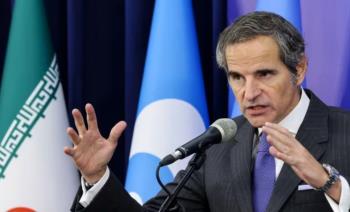Iran’s crude oil exports have surged 40% since August when the new administration came to office, the CEO of the National Iranian Oil Company (NIOC) says, adding gas condensate sales have grown 250%.
"We have exported to some of the target countries more than during the implementation of the JCPOA,” Mohsen Khojastehmehr was quoted as saying Wednesday, referring to the Joint Comprehensive Plan of Action, a multilateral agreement on Iran’s nuclear program.
Former US President Donald Trump exited the 2015 nuclear accord in 2018 and reimposed sanctions aimed at curbing oil exports and the associated revenue to Iran, but the Islamic Republic kept some exports flowing despite the sanctions.
In recent months, international tanker trackers and shipping sources have confirmed rising Iranian oil exports amid tight global supply that has helped to push oil prices to multi-year highs.
Khojastehmehr said the government’s policy is to reclaim Iran’s share of the market and return to export levels before the US sanctions.
"Compared to the beginning of the new government, exports of gas condensate have increased two and a half times. In the field of crude oil, we have had an overall increase of more than 40% in exports," he added.
In recent months, the US has aggressively been trying to track Iran’s tankers and seize them, but Iranian Minister of Petroleum Javad Owji says those efforts have been futile.
According to Owji, Iran's oil exports have risen under the toughest sanctions and without waiting for the outcome of the ongoing Vienna talks to remove them.
The increase is thanks to different methods used to win contracts and finding different buyers. Owji has said Iran “took oil to the places the Americans cannot even think of”.
Officials have also rejected claims that the Biden administration had eased the pressure of sanctions on Iran amid the Vienna talks and rising prices, saying that on the contrary, the US has grown more aggressive.
“Not only has the enemy not eased its sanctions, but it has also made them worse by going after Iranian ships and trying to capture our ships in order to prevent a jump in Iran’s oil exports,” Owji said earlier this month.
His remarks followed reports of the seizure of an Iranian oil tanker in the Bahamas, even as talks in Vienna to revive the nuclear deal could see the removal of US sanctions.
“In only one or two cases the Americans’ acts of aggression against the ships carrying Iranian oil were covered by the media, but several other cases were not. Fortunately, the armed forces, especially the IRGC Navy, did not allow the enemy to succeed,”” Owji said.
According to the minister, the administration of President Ebrahim Raeisi has used everything at its disposal to export Iranian oil and increase the country’s oil sales.
On Tuesday, President Raeisi approved the public budget for the Persian year which started on March 20.
The budget aims for 8% economic growth and increased crude oil sales of 1.2 million barrels per day (bpd) at $60 despite continued US sanctions.
Official have said the fiscal plan for this Iranian year was drawn up on the assumption that the US sanctions would persist. It envisages at least $30 billion in oil export revenues for the government.
The annual state budget of 36,310 trillion rials (about 116 billion euros at the free market rate) is 26% more than last year’s budget.
It includes the general government budget accounting for 41% of the total and the budget for public enterprises comprising all public companies, banks, and institutions. Compared to last year, the general government budget and that of public enterprises is up 9.57% and 29% respectively.
The contractionary budget marked by a less than 10% increase in the general government spending is aimed at controlling high inflation which stood above 40% for much of the last Persian year.
Traditionally, governments in Iran have offset their budget deficit by taking over from the Central Bank, borrowing from the bank and printing banknotes, which has resulted in a bulge in the monetary base and liquidity and high inflation.
The new budget will be financed by a 9% rise in oil revenues and 62% increase in tax income compared to last year.
The government has specially pledged to target the speculative market which the former administration was reluctant to tax. Over the years, many speculators have shifted to purchasing foreign currencies, cryptocurrencies, gold, cars and real estate instead of investing in productive activities.
President Raesi’s "important promises" under seven headings to revive Iran's economy include achieving an economic growth rate of 5 percent without oil and doubling non-oil exports to $70 billion in four years.
This is very important because to compensate for the reduction in government expenditure, other components of aggregate demand, namely consumption, investment, and net exports, have to increase.



























